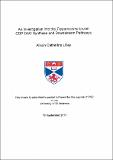An investigation into the Trypanosoma brucei CDP-DAG synthase and downstream pathways
Abstract
Lipid metabolism in Trypanosoma brucei, the causative agent of African sleeping
sickness, differs from its human host, allowing a plethora of novel drug targets to be discovered and validated. Cytidine diphosphate diacylglycerol (CDP-DAG) is a central lipid intermediate produced by the enzyme CDP-DAG synthase (CDS), but nothing was known about CDS in T. brucei. Only one gene encodes CDS in Trypanosoma brucei
(Tb927.7.220) and this was shown to encode a functional CDS by overexpression in E. coli and complementation of a yeast CDS null, which was created during this study. Expression and activity of TbCDS was confirmed in T. brucei, and was shown to be
essential in both life cycle stages. Disruption of TbCDS altered the lipid profile of T. brucei, confirming a central role for CDP-DAG in phospholipid synthesis. Biochemical and morphological characterisation of mutants in TbCDS expression elucidated at least two separately localised and regulated pools of CDP-DAG and phosphatidylinositol in T. brucei. In bloodstream form these pools are localised to the Golgi and the ER, however in procyclics it is possible that both of these pools are localised to the Golgi, since no phosphatidylinositol synthase protein was detected in the ER of procyclics. Reduction in TbCDS was shown to affect cell cycle regulation and Golgi segregation possibly due to a depletion of phosphorylated phosphatidylinositols (PIPs). These studies also indicate that phosphatidylglycerol may be synthesised by the phosphatidylglycerol-phosphate synthase which may be capable of using phosphatidylserine as a substrate in a headgroup swapping reaction. TbCDS has now been genetically validated as a drug target, and has highlighted novel aspects of lipid biosynthesis in T. brucei. Collectively, these findings highlight the central role played by TbCDS and the new knowledge gained here may lead to the discovery and validation of other novel drug targets against African sleeping sickness.
Type
Thesis, PhD Doctor of Philosophy
Collections
Items in the St Andrews Research Repository are protected by copyright, with all rights reserved, unless otherwise indicated.

